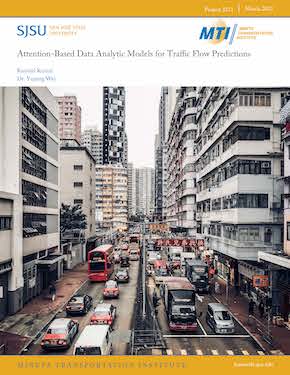- 408-924-7560
- mineta-institute@sjsu.edu
- Donate
Attention-Based Data Analytic Models for Traffic Flow Predictions
Traffic congestion causes Americans to lose millions of hours and dollars each year. In fact, 1.9 billion gallons of fuel are wasted each year due to traffic congestion, and each hour stuck in traffic costs about $21 in wasted time and fuel. The traffic congestion can be caused by various factors, such as bottlenecks, traffic incidents, bad weather, work zones, poor traffic signal timing, and special events. One key step to addressing traffic congestion and identifying its root cause is an accurate prediction of traffic flow. Accurate traffic flow prediction is also important for the successful deployment of smart transportation systems. It can help road users make better travel decisions to avoid traffic congestion areas so that passenger and freight movements can be optimized to improve the mobility of people and goods. Moreover, it can also help reduce carbon emissions and the risks of traffic incidents. Although numerous methods have been developed for traffic flow predictions, current methods have limitations in utilizing the most relevant part of traffic flow data and considering the correlation among the collected high-dimensional features. To address this issue, this project developed attention-based methodologies for traffic flow predictions. We propose the use of an attention-based deep learning model that incorporates the attention mechanism with Long Short-Term Memory (LSTM) and Gated Recurrent Unit (GRU) networks. This attention mechanism can calculate the importance level of traffic flow data and enable the model to consider the most relevant part of the data while making predictions, thus improving accuracy and reducing prediction duration.
KAUSHAL KUMAR
Kaushal Kumar began pursuing his MS degree in Industrial and Systems Engineering at San Jose State University in 2022. He is currently working with National Renewable Energy Laboratory (NREL) as a battery supply chain intern.
YUPENG WEI, PHD
Dr. Wei is an Assistant Professor in Industrial and Systems Engineering at San Jose State University (SJSU). His research interests include optimization, machine learning, and data analytics and their applications in quality monitoring, anomaly detection, and degradation prognostics.
-
Contact Us
San José State University One Washington Square, San Jose, CA 95192 Phone: 408-924-7560 Email: mineta-institute@sjsu.edu






